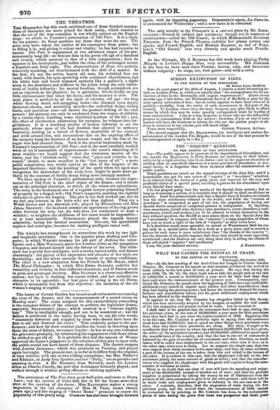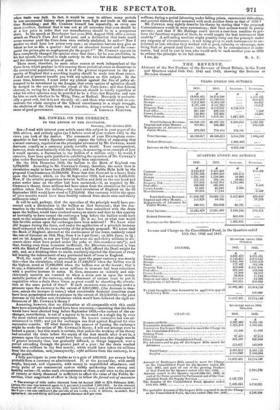WHAT HAS CAUSED THE REVIVAL IN TRADE.
TO THE EDITOR OF THE SPECTATOR.
Edinburgh, 9th October 1843.
SIR—At the late meeting of the Anti-Corn-law League in Covent Garden Theatre, Mr. COBDEN in his speech on that occasion attributed the revival in trade entirely to the low price of corn at present. He says that during the years 1838, '39, '40, '41, '42, when trade was so bad, the people paid at the rate of 5,000,000/. a month or 60,000,000/. a year more for their food than they have paid since the commencement of the present year. Consequently, con- tinues Mr. COBDEN, the people since the beginning of 1843 have had 5,000,000/. additional every month to expend upon clothes and other manufactures than they had during the previous years ; and hence the increased demand for manu- factures and manufactory labour, and the great additional employment which has been afforded to the workmen.
It appears to me, that Mr. COBDEN Las altogether failed by this theory, which has been universally adopted by the League, to explain the real causes of the late stagnation and present revival in trade. Let us examine it. I shall take it for granted that the consumers have bad to pay, during the five previous years, at the rate of 60,000,0001. a year more for their provisions than they have bad to pay since the commencement of 1843. Supposing this to be the case, Mr. COBDEN is perfectly right in saying that the consumers must have had 60,000,0001. less to spend on other things when provisions were dear, than they have when provisions are cheap. But then, it ought to be recollected, that the parties to whom the additional 60,000,0001. had been given, the sellers of the agricultural produce, had 60,000,000L additional to spend upon the manufactures of the country, and that the loss to one set of customers is balanced by the gain of another set of customers; and that, therefore, as much labour will be called into employment in the one case, when corn is dear, as in the other case, when corn is cheap. Let us suppose the simple case, that two men expend their whole incomes at the same shop ; and that, by some accident, a part of the income of the one is taken from him and added to the income of the other. It is evident in this case, that the shopkeeper will sell to the two customers jointly the same amount of goods as before ; and that the manufac- turers who supplied the shopkeeper with his goods will require to keep the same number of workmen as before.
There is no doubt that one class of men will have the spending and enjoy- ment of the 60,000,0001. instead of another set of men; and that the greatest injustice is perpetrated by taking the money by act of Parliament Isom the pockets of the cora-consumers to give it to the corn-growers : still there will he as much trade and employment given to industry in the one case as in the other. I maintain, therefore, that the stagnation of trade during the five previous years, and the revival since the commencement of 1843, cannot be accounted for by pointing, as Mr. COBDEN has done, to the comparative prices of earn. daring pia years that trade was prosperous and those years. when trade war dulL In fact, it would be easy to adduce many periods in our commercial history when provisions were high and trade at the same time flourishing: and Mr. COBDIIII himself has repeatedly, as every one must recollect, declared that it was not at all necessary that corn should be at a low price in order that our manufactures should be in a prosperous state. In his speech at Manchester last year, 20th August 1842, after a severe attack on PEEL'S Corn Act of last year, and a declaration that trade could never recover until the Corn-laws were entirely abolished, he said-" Now I predict we shall have low prices very soon ; an abundant harvest may give us wheat as low as 40s. a quarter : but will an abundant harvest and the conse-
low prices give us employment for the people ? " Mr. COBDEN appears to ace completely changed his opinion since that time; for he now attributes, in his last speech, the revival in trade entirely to the two last abundant harvests, and the consequent low prices of grain.
There must, therefore, be some other causes at work independent of the Corn-laws, which produce in this country those periodical crises so disastrous to the commercial population ; and it is of the greatest importance to the pro- sperity of England that a searching inquiry should be made into those causes. I shall not at present trouble you with my opinions on this subject. In the mean time, however, I must enter my protest against the line of policy at- tempted to be introduced by the League, that every species of agitation should be merged in the one point-the repeal of the Corn-laws ; and that Liberal electors, in voting for a Member of Parliament, should be totally regardless of what his other opinions may be provided he be a Corn-law Repealer, and vote for him as inch whether he be Whig, Tory, or Radical. Monopoly is undoubt- edly a great evil, but it is not the only one ; and those who would wish to con- centrate the whole energies of the Liberal constituency in a single struggle, the abolition of the Corn-laws, are, I conceive, doing a serious injury to the



























 Previous page
Previous page